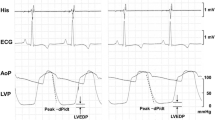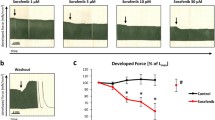Abstract
Concerns have been raised about the development of heart failure in patients treated for cancer with angiogenesis inhibitors, such as the tyrosine kinase inhibitor sunitinib. Patients with previous coronary artery disease and hypertension have an increased risk of developing heart failure. Therefore, we studied the effect of sunitinib on the contractility of isolated human atrial trabeculae and the effect on recovery after ischemic stimulation. After informed consent, the atrial appendage of patients undergoing cardiac surgery was harvested and isolated trabeculae were placed in an organ bath with a force transducer. During electrical stimulation, contractile force was measured during normal pacing or after simulated ischemia. Of each patient, one trabecula was perfused with control and one with sunitinib. Contractile force (expressed as percentage of baseline force) declined over time to 57 ± 8 and 73 ± 20 % after 150 min of stimulation for solvent- and sunitinib-treated trabeculae, respectively (mean ± SE; n = 8; p > 0.1). After simulated ischemia and reperfusion, contractile force was 40 ± 6 % in the control compared to 39 ± 6 % in the sunitinib-treated trabeculae during the last final 5 min of reperfusion (n = 12; p > 0.1). Sunitinib at low, but clinically relevant, concentrations does not have a direct effect on function of human atrial cardiomyocytes nor does it attenuate the recovery in contractile force of atrial cardiomyocytes after a period of ischemia. A direct and acute toxic effect on cardiomyocytes does not explain the development of heart failure in patients treated with sunitinib.


Similar content being viewed by others
References
Chu TF, Rupnick MA, Kerkela R, Dallabrida SM, Zurakowski D, Nguyen L, Woulfe K, Pravda E, Cassiola F, Desai J, George S, Morgan JA, Harris DM, Ismail NS, Chen JH, Schoen FJ, Van den Abbeele AD, Demetri GD, Force T, Chen MH (2007) Cardiotoxicity associated with tyrosine kinase inhibitor sunitinib. Lancet 370(9604):2011–2019
Motzer RJ, Hutson TE, Tomczak P, Michaelson MD, Bukowski RM, Rixe O, Oudard S, Negrier S, Szczylik C, Kim ST, Chen I, Bycott PW, Baum CM, Figlin RA (2007) Sunitinib versus interferon alfa in metastatic renal-cell carcinoma. N Engl J Med 356(2):115–124
Telli ML, Witteles RM, Fisher GA, Srinivas S (2008) Cardiotoxicity associated with the cancer therapeutic agent sunitinib malate. Ann Oncol 19(9):1613–1618
Qi WX, Shen Z, Tang LN, Yao Y (2014) Congestive heart failure risk in cancer patients treated with VEGFR-TKIs: a systematic review and meta-analysis of 36 clinical trials. Br J Clin Pharmacol. doi:10.1111/bcp.12387
Hall PS, Harshman LC, Srinivas S, Witteles RM (2013) The frequency and severity of cardiovascular toxicity from targeted therapy in advanced renal cell carcinoma patients. JACC Heart Fail 1(1):72–78. doi:10.1016/j.jchf.2012.09.001
Schmidinger M, Zielinski CC, Vogl UM, Bojic A, Bojic M, Schukro C, Ruhsam M, Hejna M, Schmidinger H (2008) Cardiac toxicity of sunitinib and sorafenib in patients with metastatic renal cell carcinoma. J Clin Oncol 26(32):5204–5212. doi:10.1200/JCO.2007.15.6331
Di LG, Autorino R, Bruni G, Carteni G, Ricevuto E, Tudini M, Ficorella C, Romano C, Aieta M, Giordano A, Giuliano M, Gonnella A, De NC, Rizzo M, Montesarchio V, Ewer M, De PS (2009) Cardiovascular toxicity following sunitinib therapy in metastatic renal cell carcinoma: a multicenter analysis. Ann Oncol 20(9):1535–1542
Choueiri TK, Mayer EL, Je Y, Rosenberg JE, Nguyen PL, Azzi GR, Bellmunt J, Burstein HJ, Schutz FA (2011) Congestive heart failure risk in patients with breast cancer treated with bevacizumab. J Clin Oncol 29(6):632–638. doi:10.1200/JCO.2010.31.9129
Kerkela R, Woulfe KC, Durand JB, Vagnozzi R, Kramer D, Chu TF, Beahm C, Chen MH, Force T (2009) Sunitinib-induced cardiotoxicity is mediated by off-target inhibition of AMP-activated protein kinase. Clin Transl Sci 2(1):15–25
Rainer PP, Doleschal B, Kirk JA, Sivakumaran V, Saad Z, Groschner K, Maechler H, Hoefler G, Bauernhofer T, Samonigg H, Hutterer G, Kass DA, Pieske B, von Lewinski D, Pichler M (2012) Sunitinib causes dose-dependent negative functional effects on myocardium and cardiomyocytes. BJU Int 110(10):1455–1462. doi:10.1111/j.1464-410X.2012.11134.x
Speechly-Dick ME, Grover GJ, Yellon DM (1995) Does ischemic preconditioning in the human involve protein kinase C and the ATP-dependent K+ channel? Studies of contractile function after simulated ischemia in an atrial in vitro model. Circ Res 77(5):1030–1035
Riksen NP, Zhou Z, Oyen WJ, Jaspers R, Ramakers BP, Brouwer RM, Boerman OC, Steinmetz N, Smits P, Rongen GA (2006) Caffeine prevents protection in two human models of ischemic preconditioning. J Am Coll Cardiol 48(4):700–707. doi:10.1016/j.jacc.2006.04.083
Hasinoff BB, Patel D (2010) The lack of target specificity of small molecule anticancer kinase inhibitors is correlated with their ability to damage myocytes in vitro. Toxicol Appl Pharmacol 249(2):132–139
Hasinoff BB, Patel D, O’Hara KA (2008) Mechanisms of myocyte cytotoxicity induced by the multiple receptor tyrosine kinase inhibitor sunitinib. Mol Pharmacol 74(6):1722–1728
Qian JY, Guo L (2010) Altered cytosolic Ca2+ dynamics in cultured guinea pig cardiomyocytes as an in vitro model to identify potential cardiotoxicants. Toxicol In Vitro 24(3):960–972
Arad M, Seidman CE, Seidman JG (2007) AMP-activated protein kinase in the heart: role during health and disease. Circ Res 100(4):474–488
Wang Y, Gao E, Tao L, Lau WB, Yuan Y, Goldstein BJ, Lopez BL, Christopher TA, Tian R, Koch W, Ma XL (2009) AMP-activated protein kinase deficiency enhances myocardial ischemia/reperfusion injury but has minimal effect on the antioxidant/antinitrative protection of adiponectin. Circulation 119(6):835–844
Chintalgattu V, Ai D, Langley RR, Zhang J, Bankson JA, Shih TL, Reddy AK, Coombes KR, Daher IN, Pati S, Patel SS, Pocius JS, Taffet GE, Buja LM, Entman ML, Khakoo AY (2010) Cardiomyocyte PDGFR-beta signaling is an essential component of the mouse cardiac response to load-induced stress. J Clin Invest 120(2):472–484. doi:10.1172/JCI39434
Edelberg JM, Lee SH, Kaur M, Tang L, Feirt NM, McCabe S, Bramwell O, Wong SC, Hong MK (2002) Platelet-derived growth factor-AB limits the extent of myocardial infarction in a rat model: feasibility of restoring impaired angiogenic capacity in the aging heart. Circulation 105(5):608–613
Khakoo AY, Kassiotis CM, Tannir N, Plana JC, Halushka M, Bickford C, Trent J, Champion JC, Durand JB, Lenihan DJ (2008) Heart failure associated with sunitinib malate: a multitargeted receptor tyrosine kinase inhibitor. Cancer 112(11):2500–2508
Acknowledgments
The authors would like to thank Petra van den Broek (Radboud University Medical Center) for the measurement (LCMS) of sunitinib in the perfusate, and we would like to thank the surgeons and secretariat of the Department of Cardiothoracic Surgery (Radboud University Medical Center) for the assistance in recruiting patients and the harvesting of atrial tissue. The study was funded by the Dutch Cancer Society.
Conflict of interest
The authors declare that they have no conflict of interest.
Author information
Authors and Affiliations
Corresponding author
Rights and permissions
About this article
Cite this article
Thijs, A.M.J., El Messaoudi, S., Vos, J.C.M. et al. Sunitinib does not attenuate contractile force following a period of ischemia in isolated human cardiac muscle. Targ Oncol 10, 439–443 (2015). https://doi.org/10.1007/s11523-014-0351-8
Received:
Accepted:
Published:
Issue Date:
DOI: https://doi.org/10.1007/s11523-014-0351-8




